Top 8 Most Common Water Heater Noises
Home » Plumbing » Water Heaters »
Water heaters are essential household appliances, providing the convenience of hot water for daily activities. However, like any mechanical system, water heaters can produce various noises during their operation. These sounds range from mild pops and crackles to loud bangs and whines, each indicating different conditions within the unit.
1. Popping, Crackling or Gurgling: The Sediment Problem
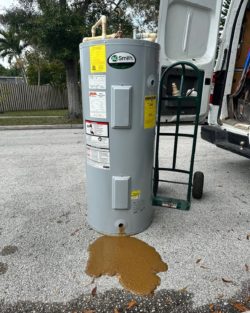
Cause: The most common sound from water heaters is a popping or crackling noise. This sound typically results from sediment buildup at the bottom of the tank. Over time, minerals like calcium and magnesium from hard water accumulate and form sediment layers. When water is heated, these minerals precipitate out of solution and settle at the bottom of the tank.
Mechanism: During heating, water trapped beneath the sediment layer turns into steam. The steam bubbles have to force their way through the sediment layer to escape, causing the popping or crackling sounds. This is akin to a pot of water boiling with a lid that’s not quite fitting; the steam pushes the lid up, creating a similar noise.
Implications: Beyond the noise, sediment acts as an insulator, reducing heat transfer from the burner or heating element to the water. This inefficiency forces the heater to work harder, increasing energy usage and stressing the tank, potentially shortening its lifespan. The sounds will also get louder over time.
Similar sounds can be made from leaking gas water heaters and dripping water onto the gas burners.
Solutions for Popping, Crackling or Gurgling: Combatting Sediment Buildup
Regular Flushing: The most effective way to combat sediment buildup is by regularly flushing the tank. This involves draining the entire water heater to wash away the sediment. Homeowners can perform this maintenance annually or more frequently (4-12 months) in areas with hard water.
Water Softener Installation: Installing a water softener in your home can significantly reduce the hardness of the water by treating the water before it enters the device. Soft water means the minerals responsible for hardness are removed and thereby decreases the rate of sediment accumulation in the tank.Sediment Filter: Adding a sediment filter to your water supply can catch minerals before they enter the tank, reducing buildup.
2. Screeching or Whining: Flow Restrictions
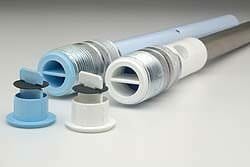
Cause: These sounds often originate from narrowed paths within the water heater or its connections. Partially closed valves, kinked flexible lines, or mineral buildup inside the pipes can create a high-velocity flow, causing a screeching or whining noise. This is often related to the inlet control valve being not fully open or scale buildup in the pipes.
Mechanism: Imagine trying to quickly force water through a narrow straw; the speed and turbulence of the water create a sound. In plumbing, similar physics apply when water rushes through constricted areas.
Implications: Besides being a nuisance, these noises signal restrictions that may stress the water heater and plumbing system, potentially leading to leaks or component failures.
Remedies for Screeching or Whining: Addressing Flow Restrictions
Valve Inspection and Adjustment: Ensure all valves, especially the inlet control valve, are fully open. Partially closed valves can restrict flow and cause noise.
Descaling: Accumulated scale within pipes or on heating elements can be removed chemically or mechanically, depending on the system’s design and manufacturer recommendations. Cleaning or replacing affected parts can alleviate these noises.
Professional Inspection: Persistent flow restrictions may require a professional plumber to inspect and possibly replace constricted pipes or components.
3. Ticking: Thermal Expansion
Cause: Ticking sounds are often due to thermal expansion and contraction in pipes and the tank itself. As metal heats, it expands; cooling leads to contraction. This natural process can cause intermittent ticking or clicking sounds.This noise may also be due to the pressure fluctuations inside the tank or loose piping straps that vibrate as water flows through them.
Mechanism: The ticking is akin to the sound of a car engine cooling down after being turned off. Metal parts expand and contract at different rates, creating audible ticks.
Implications: Ticking noises are usually not a cause for concern as they reflect normal thermal behavior. However, they can be annoying and may indicate that straps or supports for pipes are too tight, limiting natural movement.
Tackling Ticking: Managing Thermal Expansion
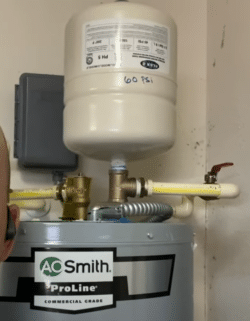
Adjustment of Strapping: Loosening overly tight pipe straps can allow for natural expansion and contraction, reducing ticking noises.
Expansion Tank: Installing an expansion tank can help absorb the pressure caused by thermal expansion, reducing stress on the water heater and associated piping.
Insulation: Properly insulating hot water pipes can minimize rapid temperature changes, reducing the frequency of ticking sounds.
4. Rumbling: The Boiling Effect
Cause: Rumbling noises take the sediment issue further. Unlike popping, rumbling occurs when large amounts of sediment have accumulated. As sediment buildup becomes significant, water trapped beneath it can start to boil vigorously causing the entire sediment bed to move. This is more common in electric water heaters where the heating elements can become encased in sediment.
Mechanism: The boiling water creates movement within the sediment layer, which is thick enough to cause the entire tank to vibrate, resulting in a rumbling sound. It’s similar to the sound of boiling water in a kettle but amplified by the sediment acting as a barrier.
Implications: Rumbling is a sign of significant inefficiency and potential overheating. It can accelerate wear on the tank and elements, leading to premature failure.
Addressing Rumbling: The Boiling Effect
Comprehensive Flushing: More aggressive flushing may be required to remove thick sediment layers. In severe cases, it might be necessary to use a deliming solution or hire a professional to thoroughly clean the tank.
Element Inspection: For electric water heaters, inspect and possibly replace heating elements that have become encased in sediment, ensuring they heat water efficiently and safely.
Tank Replacement: If the tank is too damaged or the sediment issue is too advanced, replacing the water heater might be the most cost-effective solution in the long run.
5. Banging or Knocking: Water Hammer
Cause: Also known as water hammer, banging or knocking sounds are typically caused by a phenomenon that occurs when the flow of moving water is suddenly stopped by a closing valve, causing a surge of pressure in the pipes. This is often heard when a faucet is turned off quickly or appliances like washing machines or dishwashers stop filling.
Mechanism: The sudden stop creates a shockwave that travels through the water, causing pipes to shudder or bang against walls or each other. It’s similar to the effect of slamming on the brakes in a car, where everything inside moves forward abruptly.
Implications: Regular occurrences of water hammer can damage connections and joints in your plumbing, leading to leaks. It can also stress the water heater’s internal components.
Preventing Banging or Knocking: Water Hammer Solutions
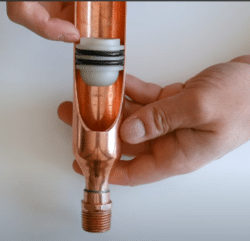
Water Hammer Arrestors: Installing water hammer arrestors can absorb the shockwave created when the flow of water is suddenly stopped, preventing the noise and helping to protect the pipes from damage.
Pressure Reducing Valve: If high water pressure is contributing to water hammer, installing or adjusting a pressure reducing valve can help manage the pressure within safe limits.
Secure Piping: Ensure all water lines are securely fastened with appropriate strapping to prevent movement that can lead to banging noises.
6. Humming Noises: Vibrations and Pressure Fluctuations
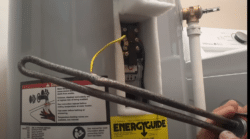
Cause: In electric water heaters, the heating elements can sometimes cause a humming noise when the electric current flows through the element, causing it to vibrate in its bracket. Humming can also be a result of loose components within the water heater. For instance, a loose inlet or outlet pipe, or even the heating element itself, might vibrate as water flows past or when heating cycles are active. In some cases, pressure fluctuations within the tank, particularly during the heating cycle, can lead to humming sounds. This is more common in closed water systems where a check valve is installed near the water heater.
Mechanism: Electric current passing through the heating elements creates electromagnetic forces, which can induce vibration if the element is not securely fastened. This vibration can resonate through the tank, producing audible humming. Loose parts vibrate under the influence of flowing water or thermal expansion, generating noise. This is akin to a loosely secured window or door rattling in the wind. Regarding pressure fluctuations, as water heats and expands, it increases the pressure inside the tank. In closed systems, this pressure can cause components of the water heater to vibrate subtly, especially if there are slight irregularities in the system’s pressure relief mechanisms.
Implications: While humming noises themselves are not immediately damaging, the conditions causing them, like loose components, can lead to increased wear and tear over time. For example, a vibrating heating element may wear out its mounting or electrical connections faster. Persistent humming and the conditions causing it could be symptomatic of inefficiencies within the system, such as improper pressure management or energy loss through vibration.
Correcting Humming Noises: Resonance and Mechanical Vibration
Tightening and Adjustments: Regular checks to ensure all components are tightly secured can prevent vibration-related humming. This includes tightening the heating elements and ensuring pipes and thermostats are securely fastened.
Pressure Management: Installing a pressure reducing valve or an expansion tank can help manage the internal pressure within the tank, reducing the likelihood of pressure-induced humming.
Sometimes slightly tightening the heating element is all it takes to solve the issue.
Professional Inspection: If the source of humming is not apparent or if the solutions do not alleviate the noise, a professional inspection is advisable. A technician can provide a comprehensive check to ensure all parts are in good condition and properly adjusted, and address any pressure issues in the system.
7. Tickling or Tapping Sounds: Mechanical Movement and Water Flow Interruption
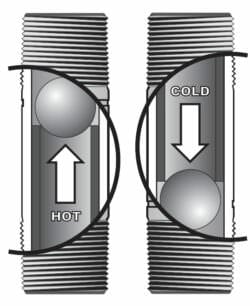
Cause: Heat traps prevent the natural convection of hot water out of the tank through the pipes (a process that can lead to energy waste). These traps often contain a ball or flap that moves in response to water flow, which can produce tickling or tapping sounds. Check valves are often installed to prevent the backflow of water and can also be a source of noise. The valve closes abruptly when water flow stops or changes direction, which can cause a tapping sound. This is particularly noticeable in systems with pumps or recirculation systems that frequently start and stop water flow.
Mechanism: As hot water rises or cold water enters the tank, the ball or flap within the heat trap moves to allow water flow while blocking heat escape. This movement can create a ticking or tapping sound as the mechanism moves back and forth. The check valve closes quickly to prevent backflow, and the sudden stop of water can create a tapping noise. This is similar to water hammer but generally less intense and occurs at the valve as it reacts to changing water pressures and flow directions.
Implications: Both heat traps and check valves are installed to improve system efficiency and prevent potential issues with water flow. However, the sounds they produce, while generally harmless, can be a source of annoyance. The repeated movement, especially in heat traps, can lead to wear over time. Though this is a slow process, eventual failure of these components could reduce the efficiency of the water heater and potentially lead to leaks.
Taming Tickling or Tapping Sounds: Efficiency vs. Noise Trade-off
Inspection and Maintenance: Regularly inspecting the heat traps and check valves for signs of wear or malfunction can help mitigate noise issues. Ensuring these components move freely and are not obstructed can reduce the intensity of the sounds.
Damping Vibrations: In some cases, adding insulation or adjusting the mounting of pipes near these components can help dampen the noise, reducing its audibility.
Alternative Designs: If the noise becomes intolerable, consider installing alternative heat trap designs that are less prone to making noise, or consult with a professional about noise-reducing check valve options that maintain efficiency without the annoyance.
8. Sizzling or Hissing Sounds: Water Contact with Hot Surfaces
Cause: This usually occurs from leaks or condensation. Small leaks in the tank or connections that allow water to drip onto hot surfaces, such as the burner assembly in gas water heaters or the heating elements in electric models, can produce a sizzling or hissing sound as the water evaporates on contact. During certain conditions, such as heavy water usage or high humidity, condensation can form on the cold outer surface of the tank and drip onto hot parts of the water heater or exhaust flue, leading to similar sizzling or hissing noises. There is a tendency for undersized water heaters and new energy efficient water heaters to have this issue.
Mechanism: Leak-induced sizzling occurs when water droplets from a leak come into contact with exceedingly hot components, they immediately evaporate, creating a sizzling sound akin to water dropped on a hot skillet. Condensation-related hissing occurs because condensation droplets follow a similar path, hissing as they evaporate upon touching hot surfaces. The sound can be more pronounced during the startup phase of the heater when the difference in temperature between the internal components and the external environment is greater.
Implications: Continuous leakage, even minor, can lead to water damage over time, affecting both the water heater and surrounding areas. Persistent dampness can also encourage mold growth. For gas water heaters, water dripping onto the burner can interfere with proper combustion, reducing efficiency. In electric models, leakage onto electrical components poses a risk of short circuits and decreased performance. The repeated exposure to dripping water can accelerate the wear and tear on affected components, potentially leading to premature failure.
Remediating Sizzling or Hissing Sounds
Identify and Repair Leaks: Inspect the water heater and associated piping for signs of leakage. Pay special attention to the tank, connections, and valves. Repairing leaks promptly can prevent further damage.
Address Condensation: Ensure proper ventilation in the area around the water heater to reduce humidity levels. For new installations or when experiencing significant condensation, consult with a professional to determine if the unit is correctly sized for your needs or if additional measures are needed to manage condensation.
Regular Maintenance: An annual inspection and maintenance routine can help identify and mitigate issues related to leaks and condensation before they become serious. This includes checking for corrosion, ensuring proper operation of pressure relief valves, and verifying that all connections are secure.
Professional Evaluation: If the source of the sizzling or hissing sound is not apparent or if repairs are beyond your comfort level, seeking professional help is advisable.
Regular Maintenance and Professional Help
Annual Inspections: Regular professional inspections can identify and mitigate many of the issues leading to water heater noises before they become serious problems.
Expert Advice: For noises that persist despite homeowner interventions, you will want to consult with a professional plumber or water heater technician. They can provide specific advice, perform necessary repairs, or recommend replacement if the unit is beyond repair.
Are These Noises a Concern?
While some noises, such as ticking, may not signify a serious problem, others can indicate issues that may lead to inefficiency or potential damage if not addressed. Sediment buildup (leading to popping, crackling, and rumbling noises) not only affects the heater’s efficiency by insulating the water from the heat source but can also cause overheating and damage to the tank lining and elements. Screeching or whining noises suggest flow restrictions that can stress the plumbing system, while banging or knocking can cause joints and connections to fail prematurely.
By understanding the causes behind water heater noises and implementing these targeted solutions, homeowners can extend the life of their water heaters, improve efficiency, and enjoy the quiet operation of their appliance. Regular maintenance, combined with prompt attention to unusual noises, is key to preventing minor issues from escalating into costly repairs.
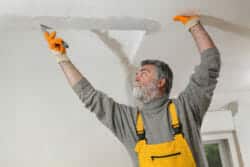


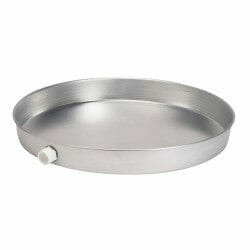
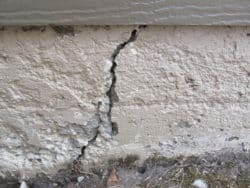
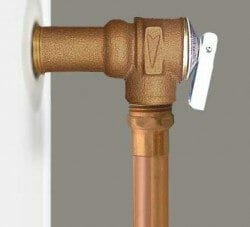
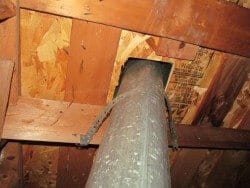



You are helpful thanks